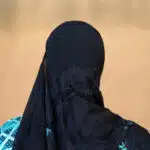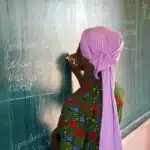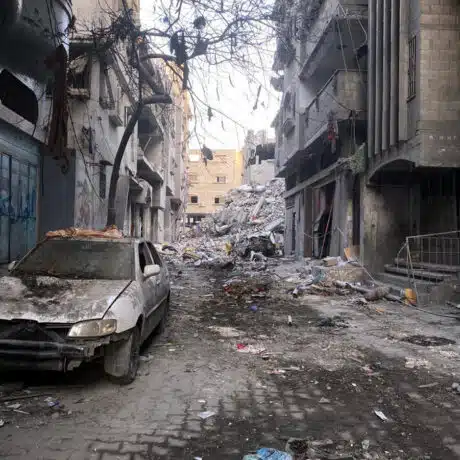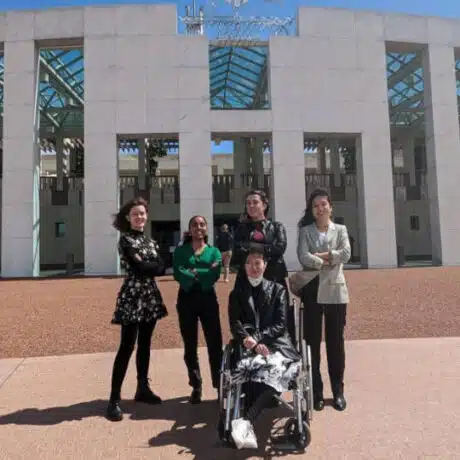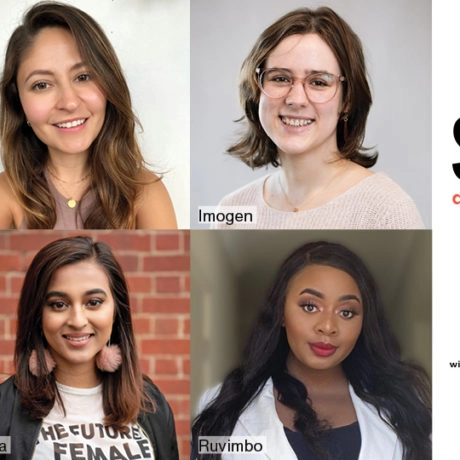News and Stories - Advocacy - 19 May 2021
Five questions with five of our Youth Activists
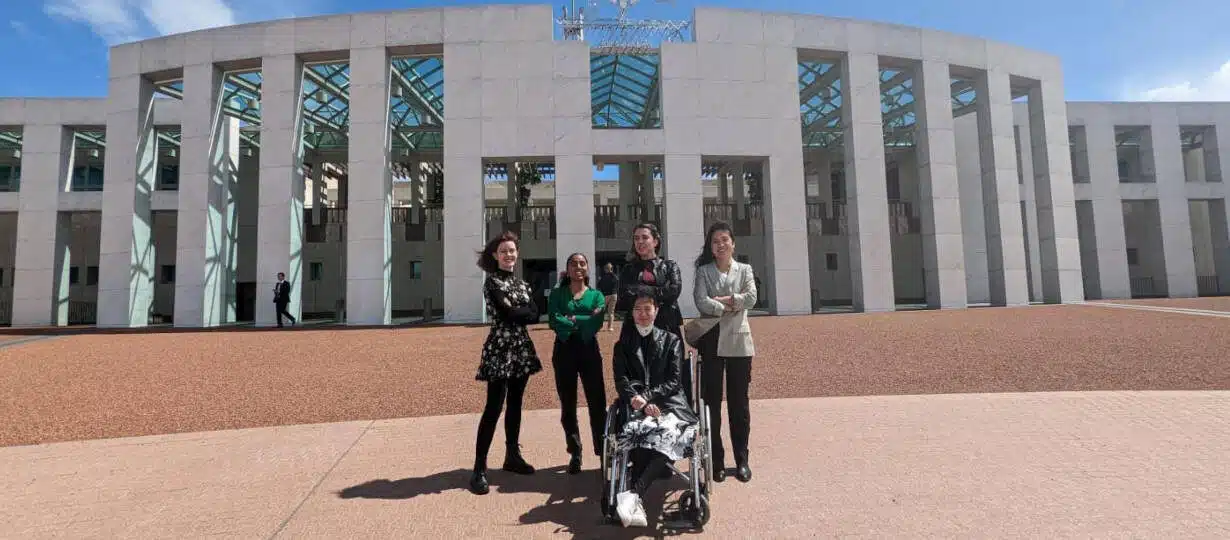
We asked five of our inspiring Plan International Australia youth activists to share their stories and why they believe educating girls has the power to change the world.
Siena
As an activist, what are you trying to do to make a difference?
Individually, I focus on facilitating dialogue with my friends and family about social and global issues. Having open conversations helps to not only raise awareness in your social circles, but also creates a ripple effect where knowledge and perspectives can spread past your individual reach. Importantly, it reduces the stigma of discussing these issues. How can we solve issues like gender based violence and climate change if we are socially intolerant of even discussing them?
How has your own story influenced your gender equality work?
My story, although unique, consists of shared experiences of discrimination, harassment and hardship. These shared, often gender specific experiences motivate me to create a better world, particularly for young people. Learning to own my story is a challenge, but the courage of survivors, activists and women everywhere empowers me to reframe my experiences as fuel which motivates my advocacy.
Why do you believe that educating girls can change their own lives, but can also transform the world?
The world benefits enormously from the contributions of those with diverse lived experiences. Providing equal access to education means those who had previously been overlooked can stand up and advocate for themselves. Educating girls is vital to improving the living conditions of impoverished communities by providing new opportunities for social cohesion and economic growth and sustainability.
What are some of the biggest hurdles girls face in getting an education?
Violent conflict, remote location, cultural intolerance, and poverty is a non exhaustive list of factors which prevent girls from receiving the basic human right of education.
How has education made an impact on your own life?
The most valuable aspect of my education has been the development of my critical thinking skills. In a world infested with fake news, being able to understand the motives of media giants, politicians and online extremist groups which disseminate misinformation is an increasingly rare skill. Teaching young people how to discern between evidence based reporting and fabricated clickbait should be a priority of all educational institutions.
Olivia
As an activist, what are you trying to do to make a difference?
To me, being an activist means always trying my best to speak up for what I believe in and drive positive change. Making a difference means refusing to remain quiet in the face of overt prejudice and initiating discussion. I try to keep up with the world and educate myself on all aspects of society on a regular basis. By facilitating discussions, we can reduce stigma and collectively find a way to move forwards.
How has your own story influenced your gender equality work?
Through individual and shared experiences of discrimination and adversity, I have become passionate about advocacy and equality. Manifestations of sexism and misogyny are deeply entrenched in the everyday life of our society. The imbalance of power between genders is viewed as ‘the norm’, and the treatment of young girls and women as inferior is customary. I fight for gender equality because females continue to face targeted acts of violence, harassment and discrimination, and I have witnessed this first hand. I want to drive positive social change to create a more equal world.
Why do you believe that educating girls can change their own lives, but can also transform the world?
Access to education is often viewed as a basic human right as it is inextricably linked to complete human development, yet so many young people are denied the possibility to learn. The benefits of educating girls are endless – by providing young girls with knowledge, we are providing them with the power to change their own lives and the world on a monumental scale. Education leads to more women in leadership positions and the workforce, contributing to social and economic development, stability, and prosperity. Ultimately, education empowers girls by providing them with skills, resources, and the ability to direct their own destiny.
What are some of the biggest hurdles girls face in getting an education?
Unfortunately, girls still face so many barriers when trying to access education. In addition to long-standing societal and cultural beliefs that girls don’t deserve an education, and that an education would be wasted on them, poverty and child labour, inadequate water and sanitation, high rates of child marriage and pregnancy, and inability to access technology and internet are just a few of the many hurdles that girls have to face before attending school.
How has education made an impact on your own life?
Through education, I have deepened my social awareness and developed my own morals and beliefs that drive my actions in everyday life. The power achieved through knowledge allows me to have control over my life and future. Education has provided me with skills and experience, introduced me to people from diverse backgrounds and helped me to grow as an individual. It is safe to say that education has played and continues to play an important part in my life.
Margaret
As an activist, what are you trying to do to make a difference?
Personally, activism is all about the little change that can be made on a day to day basis. Not only do I do my best to ensure that my behaviour follows the model of my values and what I believe in, but I try to teach others what it is that I have learned. I think part of the reason that a lot of people don’t engage with causes is because they aren’t aware or don’t have the time to learn, and if a 30 minute conversation can help someone to re-evaluate themselves then it’s all worth it. On a bigger scale, I want to engage in discussions with organisations around how to better integrate young people into the conversation and decision-making processes, as well as encourage a more diverse and proportionally representative government system at all levels in Australia.
How has your own story influenced your gender equality work?
I had this moment when I was 19 that changed my life. Someone asked me what I thought feminism meant, and I had no idea what to say beyond the words ‘fighting for gender equality’. The realisation that I had grown up not really knowing what the battle for gender equality entailed or meant was a life-changing moment that shifted my entire perspective on the world. As I began to read feminist literature, I realised that I had been subject to misogynistic behaviours and micro-aggressions my whole life, and I barely even knew it. These days, I’m deeply passionate about intersectional feminism and ensuring that in our battle against patriarchal systems that we are inclusive to all, because the more we band together, the stronger we are.
Why do you believe that educating girls can change their own lives, but can also transform the world?
I truly believe that if we provided girls all across the world with a full education, that it would provide an agency and independence for so many young women. It would allow these girls to go out and work, make their own money, start businesses and be empowered. Collectively, we could dismantle patriarchal structures if women everywhere were able to have an understanding of how these structures keep them oppressed. If we gave education to every girl, there could potentially be a decrease in forced child marriage and a slow to the immense population growth that we are seeing all over the world. There are countless ways that education could not only improve the individual lives of these girls, but also would improve the world itself.
What are some of the biggest hurdles girls face in getting an education?
I was reading recently about how child marriage and early pregnancies are some of the most common reasons why girls are being pulled out of school and kept in the home in third world countries. It is also related to war-torn disaster zones, or refugee status that girls might not be able to get an education. All of these scenarios prevent girls from having agency or the ability to live independently from their male family members or husbands.
How has education made an impact on your own life?
My education has shaped me more than anything else. I have been so lucky to be given the opportunity to go through 13 years of schooling, and to be surrounded by books and other sources of knowledge for my entire life. Without education, I feel that I wouldn’t be able to articulate myself, or the things that I want in a clear and meaningful way. I have had the opportunity to define my identity and understanding of the world around me through my experiences with education and the knowledge that has been taught to me. I think education is something that so many of us take for granted, and yet the opportunities that it provides to us are immense and eye-opening.
Harleen
As an activist, what are you trying to do to make a difference?
As an activist, to create change, it must initially begin with yourself. Everyday I find that by being an activist, it doesn’t mean that you have to necessarily get all things right, rather you should be aiming to pursue knowledge in all areas to the best of your ability so you can strive to fight for things that matter, with a well informed perspective. Education is a key factor to change, and can be used to change the lives of millions of people around the world, especially young girls. It is truly a form of liberation.
How has your own story influenced your gender equality work?
My own story has influenced the vast part of my activism in gender equality. Personally, my own experiences with sexism, misogyny, and racism have all allowed me to see the intersecting barriers of these systemic issues, and to tackle an issue such as climate change, we must also challenge the patriarchy in order to retrieve climate justice. My gender equality work has come from a place of understanding my own internalised misogyny, and how that was not only harmful to other girls around me, but as well as myself
Why do you believe that educating girls can change their own lives, but can also transform the world?
Educating girls allows for more passionate, empowered, and world changing people, who are more confident in themselves and have every ability to change the world around them. In terms of solving the climate crisis, securing women’s rights to erudition of family planning can significantly change their health and wellbeing, whilst avoiding emissions and allowing them to be more aware of how to plan for human induced climate disasters.
What are some of the biggest hurdles girls face in getting an education?
Issues of child marriage and pregancy, are extrmeme bariers faced by young girls who are striving for an education. This harms their safety and accessibility to attend schools but also their lack of financial stability to support their education as well as their families.
How has education made an impact on your own life?
Education is something I have honestly always taken for granted, rather than realising how privileged I was to be informed about the issues I now advocate for. Although education is not a privilege, I feel immense gratitude for all the things I have been taught, knowing not everyone in the world has access to their right of education. Educating myself and by being educated by the brilliant people around me, has led me to educate others, which is the powerful and influential effect education has; always informing and changing the mindsets of people.
Sandhya
As an activist, what are you trying to do to make a difference?
Activism can take on countless forms. To me, it’s about starting conversations and creating space for voices that are often left unheard. It’s also about ensuring that the discussions we have are challenging, but conducive to change. I try to centre my activism around unity –whether it’s around a dinner table or across the boardroom, I think that finding some common ground, however small it might be, is the first step towards meaningful action.To me, activism isn’t about individuals making dramatic change, it’s about harnessing the passion and commitment of an entire group to effect small changes in their micro-environments, and allowing the ripples to grow.
How has your own story influenced your gender equality work?
As a first-generation Australian immigrant, I’ve come to appreciate the way issues surrounding gender, while faced by women everywhere, are often amplified in combination by other factors of identity, such as race. I’m troubled by the way Asian women are characterised in media and discourse, as well as how few voices are heard on these issues. Migrant and minority communities have grown to anticipate, tolerate and remain silent on discrimination; my lived experience of these issues reminds me of the importance of addressing the intersectionality of gender issues when trying to drive change.
How has education made an impact on your own life?
My education equipped me with the skills and knowledge to meaningfully engage with the world around me, but the most important thing I left school with was the confidence in my ability to do so. Self-confidence is an issue that many women and girls struggle with, and I think that the time we spend learning and growing also allows us to appreciate the value of our thoughts and ideas.
Why do you believe that educating girls can change their own lives, but can also transform the world?
When allow girls an education, we give them a seat at the decision-making table – at home, in their communities, and on the global stage. When making decisions on their futures and that of the world, we often see these women look back towards their communities and use their skills and platform to uplift and empower others. Giving girls an education is a critical step in creating a fairer, more just world not just for women, but for all.
Generously supported by our partners at The Body Shop, the Youth Activist Series (YAS) is Plan International Australia’s annual program for young people who are passionate about campaigning for gender justice and equality.

